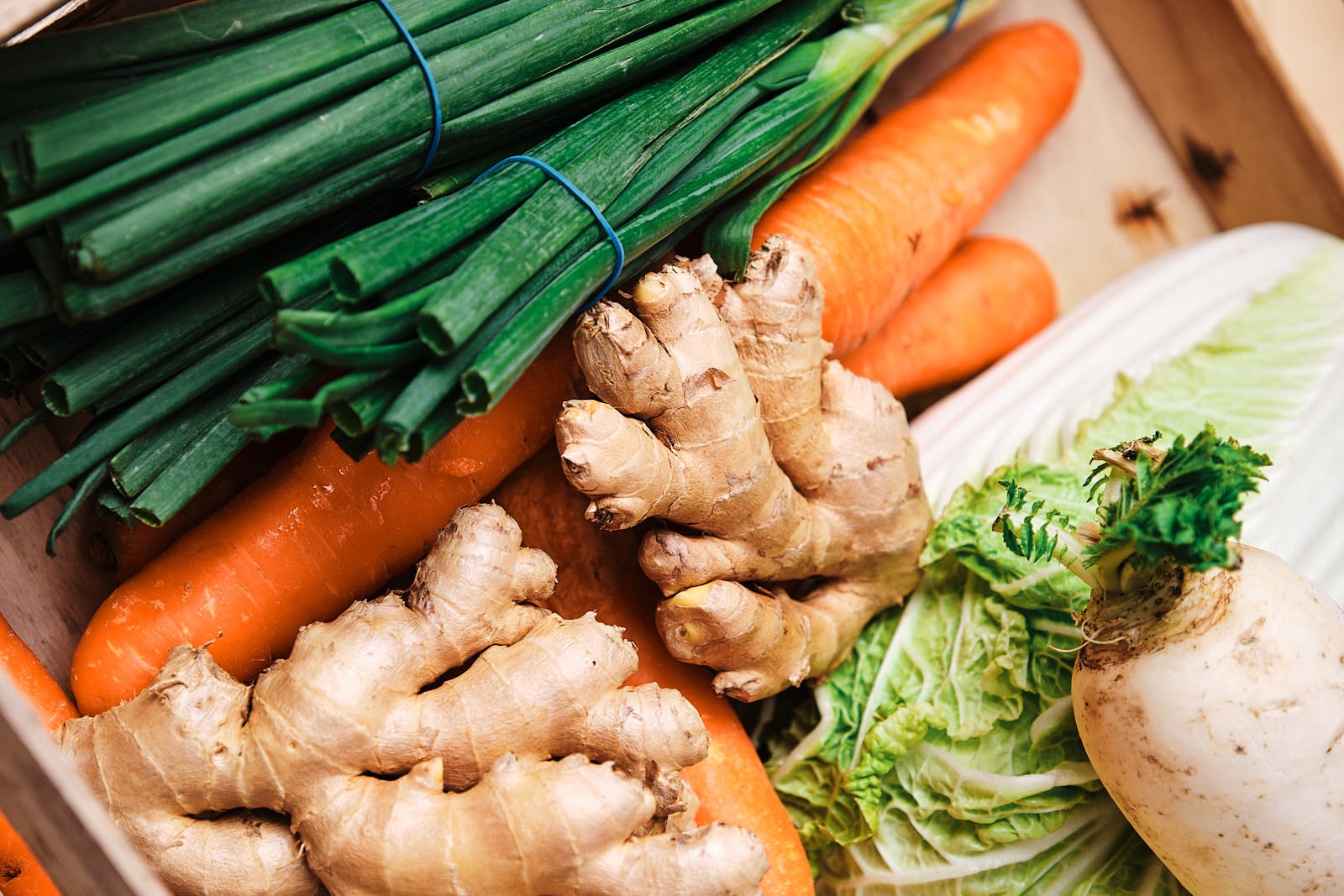ABOUT OUR FERMENTS
Collapsible content
What is Kimchi?
Kimchi is a broad Korean term for salted and fermented vegetables. Most often, and in our version this means blending Chinese Leaf (Napa Cabbage) with other vegetables and seasonings such as garlic, ginger and a Korean chilli powder called Gochagaru. The beneficial bacteria produce acids and other flavour compounds to create this delicious Korean staple food. For more information on how to use Kimchi, take a look at our product details page and look out for recipes coming soon.
What is Sauerkraut?
Sauerkraut is raw cabbage that has been salted and fermented by beneficial bacteria. This process gives sauerkraut its distinctive sour flavour and preserves the cabbage due to the production of acetic acid, lactic acid and other delicious flavour compounds.
Are your ferments vegan or gluten free?
Yes to both! We don’t use any animal-based products in our ferments. We also don’t use any ingredients containing gluten. In fact, apart from the staff huddle hub we don’t use any such products anywhere in our fermentary.
Are your ferments pasteurised?
Absolutely not! We keep our ferments alive and unpasteurised so that you can reap the benefits of the amazing lactic acid bacteria. These probiotics can have an amazing effect on your gut microbiome and that’s just the way we like it. Take a look at our “What are the benefits of fermented foods?” question for more information.
Are fermented foods high in salt?
It depends on how much you eat. We say that a serving is 50g, which can equate to just over 10% of your recommended dietary allowance. If you are at risk of high blood pressure or are on a low sodium diet, you should approach fermented foods with caution and maybe ask your healthcare provider for advice. To put the salt content of fermented foods into perspective, the average salt content of hard-pressed cheese is 1.72g per 100g, the salt content of our Sauerkraut is 1.4g of salt per 100g. On balance, it depends on what else you are eating, remember that we should all be looking at maintaining a balanced diet and that one food isn’t going to be a one stop solution.
How should I store my ferments?
Although your ferments will be fine out of a fridge for a few days, once at home they need to be stored in a fridge under 5°C, effectively stopping them from fermenting any further. If left unrefrigerated for a long time, the fermentation process will continue, and you may end up with an overly sour product. If you are not planning to eat your ferments all in one go, always re-seal the pouch using the zip-lock seal and place back in the fridge. Only ever use clean utensils when serving up your favourite ferment, you don’t want any unwanted guests!
What is the best way to eat my ferments?
In or on anything you like! Our ferments are the perfect way to add flavour and texture to any dish. Try our Sauerkrauts in salads, sandwiches, soups and stews. They are a fantastic way of cutting through the fat content of any dish containing meats, fish, cream and cheese. Kimchi is also fantastic in salads and sandwiches, or with rice, noodles and soups.
We recommend two different ways to integrate our ferments into your cooking, either at the start or the end of your chosen recipe. If you have a recipe that requires stewing or braising, you can add your ferment at the beginning, allowing all of the flavours to meld together during the cooking process. This will kill the beneficial bacteria, but the taste will be amazing! You can also add your ferment at the end of a recipe, giving your dish a real boost in flavour and texture. The acidity and salt content are the perfect seasoning, boosting the flavours already in your dish. Simply remove your dish from the heat and stir in a few spoonfuls, delicious! We will be posting as many recipes as we can, become a friend of Cultura Live Food to receive offers, tips and recipes. We would love to have you along for the ride!
THE BENEFITS OF FERMENTED FOODS

-
FIRSTLY, THE TASTE!
Fermentation of vegetables breaks down the complex carbohydrates into their constituent parts such as simple sugars and amino acids. Our sense of taste has evolved to recognise foods that are beneficial to us. This is why the sense of sweet, sour and umami (the elusive pleasant savoury taste) are so attractive to us and why fermented foods can transform the mundane into something spectacular!
-
IMPROVE YOUR GUT HEALTH
Unpasteurised fermented foods contain probiotics, these are live microorganisms that can aid digestion and strengthen your gut microbiome. These microorganisms can restore the balance of naturally occurring bacteria in your gut, compete with harmful bacteria and help you to digest fibre. Due to the high levels of fibre in Sauerkrauts and Kimchi, they are also a good source of prebiotics. Prebiotics act as food for the microorganisms in your gut. By strengthening your probiotic microorganisms, you are then in turn giving your microbiome a further helping hand.
-
INCREASED NUTRITIONAL CONTENT
Fermentation can help to increase the health potential of foods by making fibre, vitamins and minerals more readily available for our bodies to absorb. Our ferments are a good source of vitamin C, vitamin A, B vitamins and vitamin K. They are also a good source of iron, potassium and magnesium. These nutrients have a number of possible benefits such as increased bone health to reduced risk of heart disease and lower cholesterol levels.
-
BOOST YOUR IMMUNE SYSTEM
Although not clinically proven, there have been compelling studies in which it has been suggested that fermented foods can strengthen the immune system by their anti-inflammatory and antioxidant properties. This can lead to alleviation of systems in conditions such as IBS and increase protection against infections.
-
HELP WITH STRESS & ANXIETY
Your gut and your brain form a two-way communication system known as The Gut-Brain Axis. There is a lot of ongoing research into this system and the effects that it has on the body. A healthy microbiome can improve the production of gut produced hormones such as serotonin, which amongst other functions in the body, can positively affect your mood, anxiety, happiness and lower your stress levels.
-
FIGHT DEPRESSION
Dopamine is another gut produced hormone that can positively affect motivation, focus, memory, sleep patterns and movement. By improving the health of your gut microbiome with fermented foods, you can help these hormones to reduce the risk of depression.
ABOUT CULTURA LIVE FOODS
Collapsible content
Where are you based?
Cultura Live Food is based in the heart of West Cornwall, our fermentary was previously the carpenters workshop at King Edward Mine. We are very lucky to be surrounded by this stunning land of contrasts, where the lush farmland meets the rugged coast of the Atlantic Ocean. Like many other local producers, I started as a one-man band with help from my amazing wife Dan, and my two spirited kids, Luke and Penny. I doubt that any of them want to stick on another label ever again! We are now growing the team to keep up with the demand for our delicious fermented pickles.
Where do you get your produce from?
As much as possible, we work with local farmers and market gardeners. This allows us to receive produce within 48 hours of harvesting. We also use Cornwall based wholesalers who have built a well-established list of quality producers from across Cornwall, Devon and the rest of the UK. These farmers are passionate about their produce which is collected fresh from their farms daily. If you are a Cornish based grower then please get in contact as we are always looking to secure the freshest, best quality produce that we can get our hands on. Especially if you think you can grow Chinese Leaf for us!
Where can I buy your products?
You can buy our ferments directly from here, orders will be processed and despatched weekly. For more information on postal deliveries, please take a look at the delivery section in our website shop.
We also sell our ferments at a couple of fabulous farmers markets:
The Food Barn – Tregew TR11 5UQ. Every 1st and 3rd Saturday of the month 9am – 1pm.
The Farmyard Market – Truro TR1 1TD. Every 2nd Saturday of the month 9am – 1pm.
We are also stocked in a growing number of quality retailers, farm shops and
distributers. If you would like to become a stockist, or if you are a kitchen wishing to
buy in larger pack sizes, please get in touch hello@culturafood.co.uk
Why do you use plastic packaging and not glass?
This was a very tricky decision for us as there are a few factors that we needed to consider. We all know the dangers of microplastics in the environment, this is why our pouches are made of recyclable plastic. Please recycle your pouches by taking them to a recycling point that deals with plastic bags, you can do this at most supermarkets.
When testing our ferments with glass jars, we discovered that because they are unpasteurised and alive, the beneficial bacteria continue to produce a small amount of CO2. In glass jars two things can happen. Firstly, the production of CO2 can expand the lid meaning that there is no longer an airtight seal, allowing unwanted guests to get in. The second thing that can happen is that the lid holds its shape, but the CO2 can be pushed into the ferment making it fizzy, an effect that we aren’t keen on. The plastic pouches allow for the production of CO2, there is plenty of room for the packs to expand whilst the seal will hold tight. If your pack has expanded, simply open it to allow the CO2 to escape, gently press the top of the pouch flat again and then reseal it with the zip-lock seal.
Another factor in our decision to use plastic pouches was our carbon footprint. Because we need so much more material for a glass jar opposed to a plastic pouch, its environmental impacts can exceed those of using plastic. Although waste processing has a lower environmental impact for glass, the high manufacturing impacts cause a higher global warming potential for glass compared to plastic throughout its life cycle. The heavier weight of glass means that in each transportation step along the supply chain, transporting the glass costs more fuel. This makes shipping more expensive and can cause higher climate impacts. In summary, every material that we use has an impact on our environment and we need to make a choice for each individual case.
